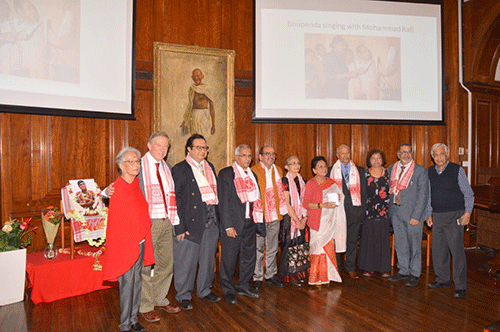Previous story:
Indian High Commission pays tribute to Dr Bhupen Hazarika on his 7th death anniversary at London
Published on November 23, 2018
The Indian High Commission in collaboration with FASS (Friends of Assam and Seven Sisters) paid tribute to Bhupen Hazarika, Shrandhanjali event at Gandhi Hall, India House on 16th November, 2018, was initiated by Rini Kakati, Assam Co-ordinator for UK, FASS (Friends of Assam and Seven Sisters)
Syed Iftikar Ahmed, medical specialist, actor and a singer was invited from Assam to deliver a power-point  presentation on Dr. Bhupen Hazarika – his life, works and achievements. Among the dignitaries present were Lord Dholakia,
presentation on Dr. Bhupen Hazarika – his life, works and achievements. Among the dignitaries present were Lord Dholakia,
 presentation on Dr. Bhupen Hazarika – his life, works and achievements. Among the dignitaries present were Lord Dholakia,
presentation on Dr. Bhupen Hazarika – his life, works and achievements. Among the dignitaries present were Lord Dholakia,Navin Shah, London Assembly Member for Brent and Harrow, Mr. A.S. Rajan Minister Co-ordination, High Commission of India , Richard Blurton, curator of British Museum, Lalit Mohan Joshi, Editor / Director, South Asian Cinema Foundation, Kailash Budhwar, Former Head of Hindi and Tamil Section, BBC World Service, Vijay Mehta, United for Peace and Ayesha Hazarika, MBE, Scottish comedian, broadcaster, political commentator, and former political adviser to senior Labour Party politicians The meeting was chaired by Rita Payne, President, Emeritus, Commonwealth Journalists Association.
Dr. Nilmoni Sikdar, Bhabani Kakati, Sandip Sen and Shahadat sang the beautiful songs of Bhupen da were rendered in Assamese, Bengali and Hindi.The highlight of the event was ‘Namami Brahmaputra’ dance was performed by Ragasudha Vinjamuri and has also presented the Indian Classical Dance eight times on different themes and occasions at the Houses of British Parliament. Bihu dance was performed by Lata Upadhya and joined by the crowd.
Prabin Hazarika, the younger brother of Bhupen Hazarika from Leicester wrote an emotional poem ‘ A Departed Soul’ which was recited by Rita Payne, President, Emeritus, Commonwealth Journalists Association.
Brahmaputra, Bihu and Bhupen – The 3 B’s that constitute the Nortrh-East.The restless jajabor or wanderer, the great cultural hero, the great Assamese, the believer in the power of the nation is no more. Now that mighty voice has fallen silent. Assam is poorer for it. The world is poorer for it.
The doyen of Assamese culture, wanted to dispel the age-old anathema of racism and communalism through his works and drew inspirations from a plethora of socio-cultural events as well as a galaxy of great personalities of the world. Often hailed as a visionary, Dr. Hazarika was greatly influenced among others by Karl Marx, Maxim Gorky, Lenin, Paul Robeson, Martin Luther King, Abraham Lincoln, Nelson Mandela and Mahatma Gandhi.
The themes of social justice and revolution crystallised at a defining moment in Hazarika’s life when he befriended US civil rights activist Paul Robeson, who told him the guitar was not just a musical instrument but an instrument for social change. Under Robeson’s influence, Hazarika wrote and set to tune the evergreen Assamese song “Bistirno Parare” (“Bistirno Dupare” in Bengali and ” Ganga Behti ho kyon” in Hindi that had an echo of Roberson’ masterpiece , “O Man River”
A poet and lyricist whose vision has always been uncompromisingly humanistic. It is no doubt for this reason that his music has always been relevant, no matter at what point of time the lyrics were originally penned, no matter what language they have been later translated into, no matter what culture away from the once tranquil now turbulent lifestyle beside his beloved Luit ( The river Brahmaputra)
We must celebrate his life. We must establish his place in the soul of humanity, whether it be India or UK. We must echo his belief that we are all one, we need to reclaim the voice which once spoke of and inspired the working classes, by singing his songs and carrying his flag – “Ami Asomiya Nohou Dukhiya”.





















